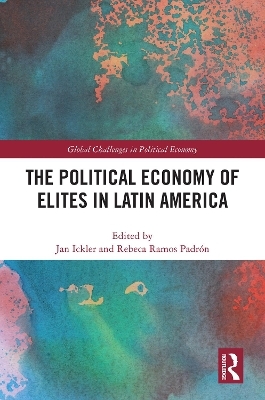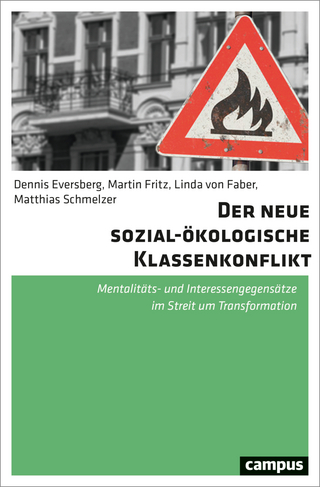
The Political Economy of Elites in Latin America
Routledge (Verlag)
978-1-032-63672-6 (ISBN)
- Lieferbar (Termin unbekannt)
- Versandkostenfrei innerhalb Deutschlands
- Auch auf Rechnung
- Verfügbarkeit in der Filiale vor Ort prüfen
- Artikel merken
Recent years have seen renewed interest in elites around the world, and their interconnection with power, privilege, social stratification, and social change. The contributors to this edited volume explore the many facets of the role of elites in the political economy of Latin America: their position within society, their impact upon the economy, and their influence within governing institutions.
The book demonstrates that in Latin America, as in many other parts of the world, structural change and movements toward more just, inclusive, and sustainable societies seem impossible without the involvement of elites at some level. This raises important questions: Under what conditions do elites push for reform? How do elites react to societal and economic challenges and changes? To what extent can popular classes successfully pressure elites? Bringing together a selection of case studies covering different Latin American countries, the book focuses on three key themes to address these questions: first, it explores how elites react to economic and societal challenges with some chapters looking at moments of change, as well as measures taken by individual elites to alter the status quo. Second, it seeks to understand the interrelation between external and domestic factors that engender elite action including global markets, geopolitics, state institutions, social forces, and the internal structure of elite groups. Third, it reflects upon methodological questions of studying elites in Latin America, laying bare the potential pitfalls and offering possible routes to further inquiry.
This book will be vital reading for researchers in political economy, development economics, economic sociology, and Latin American studies more broadly.
Jan Ickler is a researcher and Ph.D. candidate at the University of Kassel and coordinator at the Center for Advanced Latin American Studies (CALAS). He is focusing his doctoral research on the role of economic elites in Latin America’s political economy. He studied philosophy, political sciences, and sociology and obtained his Master’s degree in political economy. Rebeca Ramos Padrón is a postdoctoral researcher within the CALAS-Laboratory Project Confronting Inequalities in Latin America: Perspectives on Wealth and Power. Previously, Ramos was a DAAD fellow as a visiting professor in the Department of Political Science at the University of Kassel. For over 20 years, she worked as a professor in the Chair of Sociology at the University of Havana (UH), serving as its vice-director for 7 years. Ramos completed her Ph.D. in sociology at the UH and her MA in International Social Work at the University of Gothenburg, Sweden. Member of the UNESCO Chair on Sustainable Human Development-UH and consultant for UN-HABITAT-Cuba. She has published on issues related to social policy systems, employment, and labor market insertion from a perspective of social inequalities, socio-ecological transformation, and human development in Cuba and Latin America.
Introduction 1.The Political Economy of Elites in Latin America Part I: Elites in the Political Economy of Latin America 2.Brazilian Agribusiness and Aviation: Intra-elite Competition and Accommodation, Cross-Class Exclusion and Incorporation 3.Economic Elites and Public Sector Size in Brazil and Mexico 4. Economic Elites and Development with Equity in Bolivia and Ecuador 5. Entrenching Mexican Corporate Elites in Global Corporate Networks (and Vice-Versa) Part II: Elites and the State in Latin America 6.Chile and the Contemporary Power of Capital: Peripheral Predatory Rentier Capitalism and the Political Practices of Business Elites 7. Business and State Relations in Uncertain Times: Alliance Recalibration in Nicaragua 8. From Plutocracy to Modernity in Bolivia: Economic Elites Adapting to the State Transformation under the MAS Government Part III: Elites, Wealth, and Power 9. Earning But Not Leading: Argentina’s Economic Elites and the Exercise of Power in Global Capitalism 10. Discursive Power in Central America: Economic Elites and Disputes Over Public Policies During the Covid-19 Pandemic 11. Wealth Concentration in Latin America: The Role of Direct Taxation 12. Trusts: Searching for the Hidden Treasure in Ecuador. Index
| Erscheinungsdatum | 21.11.2024 |
|---|---|
| Reihe/Serie | Global Challenges in Political Economy |
| Zusatzinfo | 28 Tables, black and white; 21 Halftones, black and white; 21 Illustrations, black and white |
| Verlagsort | London |
| Sprache | englisch |
| Maße | 156 x 234 mm |
| Themenwelt | Sozialwissenschaften ► Ethnologie |
| Sozialwissenschaften ► Politik / Verwaltung | |
| Sozialwissenschaften ► Soziologie ► Spezielle Soziologien | |
| Wirtschaft ► Allgemeines / Lexika | |
| Wirtschaft ► Volkswirtschaftslehre ► Wirtschaftspolitik | |
| ISBN-10 | 1-032-63672-6 / 1032636726 |
| ISBN-13 | 978-1-032-63672-6 / 9781032636726 |
| Zustand | Neuware |
| Informationen gemäß Produktsicherheitsverordnung (GPSR) | |
| Haben Sie eine Frage zum Produkt? |
aus dem Bereich


